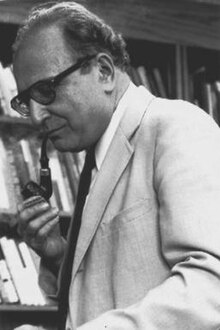Seymour Martin Lipset | |
|---|---|
 | |
| Born | March 18, 1922 New York City, New York, US |
| Died | December 31, 2006 (aged 84) |
| Academic background | |
| Alma mater | |
| Thesis | Agrarian Socialism (1949) |
| Academic work | |
| Discipline | |
| Sub-discipline | |
| School or tradition | Behaviourism |
| Institutions | |
| Main interests | |
| Notable works |
|
Seymour Martin Lipset (/ˈlɪpsɪt/ LIP-sit; March 18, 1922 – December 31, 2006) was an American sociologist and political scientist. His major work was in the fields of political sociology, trade union organization, social stratification, public opinion, and the sociology of intellectual life. He also wrote extensively about the conditions for democracy in comparative perspective. He was president of both the American Political Science Association (1979–1980) and the American Sociological Association (1992–1993). A socialist in his early life, Lipset later moved to the right, and was considered to be one of the first neoconservatives.[2][1]
At his death in 2006, The Guardian called him "the leading theorist of democracy and American exceptionalism";[2] The New York Times said he was "a pre-eminent sociologist, political scientist and incisive theorist of American uniqueness";[1] and The Washington Post said he was "one of the most influential social scientists of the past half century."[3]
- ^ a b c Cite error: The named reference
NYTimes obitwas invoked but never defined (see the help page). - ^ a b Marks, Gary (January 11, 2007). "Seymour Martin Lipset: Scholar of democracy driven to understand American society". The Guardian.
- ^ McGovern, Patrick (January 14, 2010). "The young Lipset on the iron law of oligarchy: a taste of things to come" (PDF). The British Journal of Sociology. 61 (Suppl 1): 29–42. doi:10.1111/j.1468-4446.2009.01283.x. PMID 20092476.